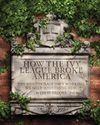
The administration drew up plans for erecting a border wall, as well as an approach to stripping away the due-process rights of noncitizens so they could be expelled faster. These changes to American immigration policy took place in the amount of time that it would take the average new hire to figure out how to use the office printer.
Within days of Trump's election, his key immigration adviser, Stephen Miller, was already gathering a group of loyal bureaucrats to start drafting executive orders. Civil servants who were veterans of the George W. Bush administration found the proposals to be so outlandishly impractical, if not also harmful to American interests and perhaps even illegal, that they assumed the ideas could never come to fruition. They were wrong. Over the next four years, lone children were loaded onto planes and sent back to the countries they had fled without so much as a notification to their families. Others were wrenched from their parents' arms as a way of sending a message to other families abroad about what awaited them if they, too, tried to enter the United States.
If given another chance to realize his goals, Miller has essentially boasted in recent interviews that he would move even faster and more forcefully. And Trump, who's been campaigning on the promise to finish the job he started on immigration policy, would fairly assume if he is reelected that harsh restrictions in that arena are precisely what the American people want. "Following the Eisenhower model, we will I carry out the largest domestic deportation operation in American history," he declared during a speech in Iowa in September, referring to 1954's offensively titled Operation Wetback, under which hundreds of thousands of people with Mexican ancestry were deported, including some who were American citizens.
Diese Geschichte stammt aus der January - February 2024-Ausgabe von The Atlantic.
Starten Sie Ihre 7-tägige kostenlose Testversion von Magzter GOLD, um auf Tausende kuratierte Premium-Storys sowie über 8.000 Zeitschriften und Zeitungen zuzugreifen.
Bereits Abonnent ? Anmelden
Diese Geschichte stammt aus der January - February 2024-Ausgabe von The Atlantic.
Starten Sie Ihre 7-tägige kostenlose Testversion von Magzter GOLD, um auf Tausende kuratierte Premium-Storys sowie über 8.000 Zeitschriften und Zeitungen zuzugreifen.
Bereits Abonnent? Anmelden

The Dark Origins of Impressionism
How the violence and deprivation of war inspired light-filled masterpieces

The Magic Mountain Saved My Life
When I was young and adrift, Thomas Manns novel gave me a sense of purpose. Today, its vision is startlingly relevant.

The Weirdest Hit in History
How Handel's Messiah became Western music's first classic

Culture Critics
Nick Cave Wants to Be Good \"I was just a nasty little guy.\"

ONE FOR THE ROAD
What I ate growing up with the Grateful Dead

Teaching Lucy
She was a superstar of American education. Then she was blamed for the country's literacy crisis. Can Lucy Calkins reclaim her good name?

A BOXER ON DEATH ROW
Iwao Hakamada spent an unprecedented five decades awaiting execution. Each day he woke up unsure whether it would be his last.

HOW THE IVY LEAGUE BROKE AMERICA
THE MERITOCRACY ISN'T WORKING. WE NEED SOMETHING NEW.

Against Type
How Jimmy O Yang became a main character

DISPATCHES
HOW TO BUILD A PALESTINIAN STATE There's still a way.